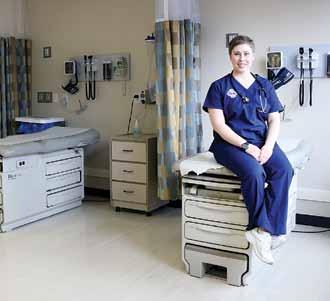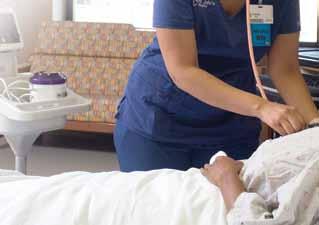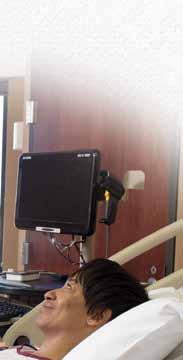






Amanda
Buechel
BSN, RN Director, ANA-Illinois Board of Directors

March 28th, 2017 marked the 19th Annual Student Nurse Political Action Day held in Springfield, Illinois. This event was attended by over 1200 nursing students from 38 different colleges of nursing (see list below). Mennonite College of Nursing at Illinois State University was honored for bringing the largest group of students at 140. The event is supported by a generous gift donated in 2013 by the former Chicago Nurses Association. This is an annual event that continues to grow every year and has become an annual tradition for many colleges throughout the state.
New this year at Student Nurse Political Action Day was an interactive photo contest. Students were encouraged to send in pictures of their experience via the ANA-Illinois mobile app, and the photos were then voted on through social media. Thank you to all of the attendees that participated and congratulations to our winner, Lexxus Soristo from Northern Illinois University!

professional careers ahead. The most important part of SNPAD was for the students to hear about multiple bills that are before the House of Representatives and the Senate that affect nurses, nursing students and their patients. Speakers included Robin Hannon MSN, RN, Director of Personal Health, St Clair County Health Department, Susan Y Swart MS, RN, CAE, ANA-Illinois Executive Director and Sue Clark, ANA-Illinois lobbyist. Six students (Stacy Hilderbrand- Frontier Community College, Seema Suleiman – University of Illinois @ Chicago, Nicole Rodiek – Robert Morris University, MaryRose Cochran – Kishwaukee Community College, Cedric Sanders –Milliken University, and Emily Ramirez, SNAI president – Aurora University) led a march to the Illinois State Capitol building where many had appointments with their local legislators to discuss the bills of importance. Many students were featured on the local news station letting the public know why political activism is so important to the nursing profession.


Students enjoyed an information filled and eventful day visiting exhibitors, learning about legislative processes. Students also had the opportunity to receive professional head shots to use for their
In the evening, nurse leaders from 12 different nursing organization and colleges or schools of nursing gathered for our 3rd Annual Evening with the Legislators. This event brings together nurse leaders and legislators as an opportunity to have an open dialogue about the state of healthcare in Illinois. Over 40 legislators got an opportunity to discuss issues of importance to healthcare with nursing leaders from across the state. This is always a great event that showcases the work happening throughout the state as their organizations strived to improve access, quality and reduce healthcare costs for the citizens of Illinois. The next day on March 29th, 2017 was Nurse Lobby Day
which was attended by over 100 nurses. Registered nurses and advanced practice registered nurses gathered to hear updates about the current bills that are in the House of Representatives and the Senate. Bills highlighted included: The Nurse Practice Act Sunset Bill (SB 625 & HB 313), the Nurse Licensure Compact Bill (SB 677 & HB 2687), and Advanced Practice Registered Nurse Full Practice Authority Bill (SB 642 & HB 312). The nurses then visited the Illinois State Capitol to meet with their legislators to discuss the bills, create awareness, and become a resource on nursing issues. Both events were an overwhelming success, helping to bring awareness to nurses and nursing students on the importance of political activism for nursing. If you would like more information on the any of the bills listed and their status, please visit the Illinois Nurses’ Grassroots Coalition website. The most updated information can be found there along with talking points for anyone to help discuss the bills with their legislators. We are hopeful in the success of all three of our major bills running this year and will continue to provide updates through our Legislative Reports given by Sue Clark and Debbie Broadfield.
List
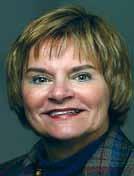
Nobel laureate physicist, Dennis Gabor, said “The best way to predict the future is to create it.” After reading my past President’s columns you probably know by now that I believe that philanthropy is one tool that allows us to help create the future! I share the work of creating a nursing future through philanthropy with our Board and staff and I have asked my INF Board colleagues to share their beliefs about philanthropy by guest editing the President’s column for future issues. I hope you will enjoy getting to know them and their views! Our first guest columnist is INF Vice-President, Dr. Alma Labunski.
Dear Colleagues:
Greetings to each one of you. On behalf of the Illinois Nurses Foundation (INF) Board of Directors I thank you for your desire to keep apprised of goings-on within our state of Illinois. This newsletter is especially designed for that purpose!
As you may well know, our Foundation’s purpose is to collaborate with community partners in promoting the health of the public by supporting nurses through

charitable, research, and educational initiatives. Although relatively young as a professional organization, the Foundation is dedicated to serving colleagues throughout the whole state of Illinois. Some examples of our philanthropic dedication relate to the following:
During 2016, numerous scholarships were available for undergraduate and graduate nursing students. The Foundation awarded a total of $13,500 in scholarships to deserving students. Also, numerous applications were submitted for 2017, the deadline was March 15, 2017.
Additionally, the Foundation has striven to recognize our young professionals for their exceptional dynamic practice. Entitled, “40 Under 40” the commemoration was initiated a few years ago and is currently being planned as the third year of recognizing deserving nurse leaders. Another group of accomplished nurse professionals will be awarded on September 14, 20175:00 p.m. at Rush University Medical Center. Watch the VOICE for further details regarding the venue.
Furthermore, our annual holiday fundraising gala as a festive celebration to honor all professionals is already scheduled for December 9, 2017 at the Hilton Hotel in Lisle, IL. Don’t forget to mark the special date on your calendar.
Moreover, given our numerous initiatives, we are also pleased to welcome a group of talented, skilled Advisory Council members who emanate from numerous areas of business and service and desire to serve the Organization. Finally, dear Colleagues, as an active long-term member of our professional organization for over 60 years, I am thankful to be able to continue serving you and our profession. I trust you will find these pages of NURSING VOICE enriching, stimulating and rewarding toward your future involvement in the initiatives of your profession.

INF Board of Directors
Officers
Maureen Shekleton, PhD, RN, DPNAP, FAAN President
Alma Labunski, PhD, MS, RN Vice President
Cathy Neuman, MSN, RN, CNAA Secretary/Treasurer
Directors
Cheryl Anema, PhD, RN
Maria Connolly, PhD, CNE, ANEF, FCCM
Karen Egenes, EdD, MSN, MA, RN
Jacqueline Garcia, MSN, APN, NP-BC
Rhys Gibson, RN, BSN
Guadalupe Hernandez, MSN, APN, FNP-BC
P. Joan Larsen, RN
Linda Olson, PhD, RN, NEA-BC
Bonnie Salvetti, BSN, RN
Kathryn Serbin, MS, DNP, RN

2015-2017
Officers
Dan Fraczkowski, MSN, RN
Ann O’Sullivan, MSN, RN, CNE, NE-BC, ANEF
Pam Brown, PhD, RN, ANEF
Kathryn Serbin, MS, DNP, RN
Directors
Amanda Buechel, BSN, RN
Karen Egenes, EdD, MSN, MA, RN
Elaine Hardy, PhD, RN
Crystal Vasquez, DNP, MS, MBA, RN, NEA-BC
Bonnie Salvetti, BSN, RN



Alma J. Labunski, Ph.D., M.S., R.N.; Vice-President IL Nurses Foundation; Editor Emeritus NURSING VOICE; ANAIL Bylaws. Consultant, Educational Challenges Within a Global Culture; Retired Dean and Professor, North Park University





Editor Emeritus
Editorial Committee
Alma Labunski, PhD, MS, RN
Chief Editors
Lisa Anderson-Shaw, DrPH, MA, MSN
Karen Mayville, MSN, PhD, RN
Members
Cheryl Anema, PhD, RN
Nancy Brent, RN, MS, JD
Kathy Long-Martin, BSN, MSN, RN
Linda Olson, PhD, RN, NEA-BC
Lisa Woodward, DNP, RN, CENP
Executive Director
Susan Y. Swart, MS, RN, CAE
ANA-Illinois/Illinois Nurses Foundation
Article Submission
• Subject to editing by the INF Executive Director & Editorial
Committee
• Electronic submissions ONLY as an attachment (word document preferred)
• Email: syswart@ana-illinois.org
• Subject Line: Nursing Voice Submission: Name of the article
• Must include the name of the author and a title.
• INF reserves the right to pull or edit any article / news submission for space and availability and/or deadlines
• If requested, notification will be given to authors once the final draft of the Nursing Voice has been submitted.
• INF does not accept monetary payment for articles.
Article submissions, deadline information and all other inquiries regarding the Nursing Voice please email: syswart@ana-illinois.org
Article Submission Dates (submissions by end of the business day) January 15th, April 15th, July 15th, October 15th
Advertising: for advertising rates and information please contact Arthur L. Davis Publishing Agency, Inc., 517 Washington Street, P.O. Box 216, Cedar Falls, Iowa 50613 (800-626-4081), sales@ aldpub.com. ANA-Illinois and the Arthur L. Davis Publishing Agency, Inc. reserve the right to reject any advertisement. Responsibility for errors in advertising is limited to corrections in the next issue or refund of price of advertisement.
Acceptance of advertising does not imply endorsement or approval by the ANA-Illinois and Illinois Nurses Foundation of products advertised, the advertisers, or the claims made. Rejection of an advertisement does not imply a product offered for advertising is without merit, or that the manufacturer lacks integrity, or that this association disapproves of the product or its use. ANA-Illinois and the Arthur L. Davis Publishing Agency, Inc. shall not be held liable for any consequences resulting from purchase or use of an advertiser’s product. Articles appearing in this publication express the opinions of the authors; they do not necessarily reflect views of the staff, board, or membership of ANA-Illinois or those of the national or local associations.
On behalf of ANA-Illinois we would like to thank you for the work you do for your patients and the profession. We hope that you had a wonderful Nurses Week this year and were recognized by colleagues and organizations for your critical role wherever you practice.
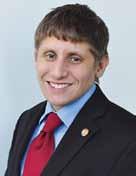
Dan
Fraczkowski MSN, RN
It has been a busy time here as a broad coalition of 26 nursing organizations has worked together to renew the Nurse Practice Act. Thank you to all the nurses and students who have participated in the process, by becoming informed, making legislator visits, phone calls, social media posts and reaching out to stakeholders. Don’t forget that the Illinois Grassroots Action Coalition portal is available to members and non-members alike free of charge as we get ready for veto session, that will occur in the fall and next year’s legislative session. Visit http:// cqrcengage.com/ilnurses/home to sign up.
Similarly, proposed federal legislation has kept ANA busy in Congress advocating on behalf of the profession and patients we care for. ANA is communicating our Principles for Health System Transformation, which were developed in 2016 by members of Congress and the President. Meanwhile, numerous proposals have been introduced, such as the 2018 budget that would eliminate funding for nursing workforce programs through the Health Resources and Services Administration (HRSA) and drastically cut funding for the National Institutes of Health (NIH) that supports research. Be sure to visit the Capitol Beat Blog http://anacapitolbeat.org/ or follow
@RNAction for the latest updates on health policy at the federal level. Communicating with your member of Congress during the summer months is essential to ensure that they are well informed about the work you do.
ANA has also developed a student nurse forum and a new graduate forum to accompany their expanded ANA online community, and new member App. There are a number of great resources there, especially for nursing students, new graduates and longtime members alike.
This summer we will issue a call for consents to serve on the Board of Directors, and elections will be held in October. If you want to take that extra step in advocacy and involvement by serving on the ANA-Illinois Board of Directors, please submit a consent to serve at that time. If you have any questions about what the various board positions entail, please reach out to us, and I am happy to speak with you. Also, our next Board of Directors meeting will be a conference call held on June 17, 2017, members are always welcome to attend, for the call in details please RSVP to Susan Swart.
Finally, I hope you can join us at our 2017 ANA Illinois membership meeting in Normal, Illinois on Saturday, November 4, 2017. I’m happy to announce that ANA President Dr. Pamela Cipriano will be our keynote speaker at the event. Based on your feedback we have a new format for the meeting that will include several continuing education sessions.
Thank you for all that you do for our patients and the profession.
Sincerely,
Dan
Fraczkowski, MSN, RN President- ANA-Illinois @NurseDanF

In celebration of National Nurses Week May 6-12, 2017 the Illinois Nurses Foundation RECOGNIZED THE EVERYDAY HEROES IN HEALTHCARE through their "HONOR A NURSE" campaign.
The INF will be accepting nominations for honorees through mid-November. We will be selecting one of the nominees for the First Annual NURSE OF THE YEAR Award.
Here is the list of Everyday Nursing Heroes honoredcheck the INF website for more!
Amanda Buechel, BSN, RN
Constance Girgenti, BSN, RN, VA-BC
Dan Fraczkowski, MSN, RN
Dianna McCoin, LPN
Dr. Joyce Keithley
Dr. Karen Egenes
Dr. Margaret Faut Callahan
Dr. Mary Lange-Alberts
Dr. Vicki Keough, PhD, APRN-BC, FAAN
Jackie Witges, RN
James Price BSN, RN
Jane Peterson, APN, CNP
Kathryn Weigel, RN
Laura Weigand, RN
Linda Ruholl, RN
Marcia Maurer, PhD, RN
Michelle Miller Lynn, RN
Mrs. Susan Fulara, RN
Nikki Burbey, RN
P. Joan Larsen, RN
Rhys A. Gibson, BSN, RN
Ricki Loar, PhD, APN, CNP, FNP-BC, GNP-BC
Rocio Garcia RN, BSN
Rosa Leland, MSN, APN, FNP-C
Ruth Fluke, RN
Sharon Bartmer, RN
Susan Y. Swart, MS, RN, CAE
Susana Gonzalez, MHA, MSN, RN, CNML
The Student Nurses Association of Illinois has been hard at work this year in creating opportunities for students to get involved. On March 18th, SNAI held their annual Leadership Conference at Illinois Wesleyan University in Bloomington, Illinois. Over 100 students and faculty attended hearing from fabulous speakers. Speakers included: Miss Colorado Kelly Johnson, Rosemary Gibson, and ANA-Illinois Vice President Ann O’Sullivan.
Student nurse leaders were nominated by their school faculty to receive the Student Nurse Pinnacle Award. Eight Students received this award: Joanna Rozemburg –Aurora University, Alyssa Herndon – Aurora University, Madeline Mullins – Blessing-Rieman College of Nursing and Health Sciences, Megan Elle – Wabaunsee Community College, Maria Riveria – Chamberlain College of Nursing, Britney Daniels – Wabaunsee Community College, and Ashley Leach – Wabaunsee Community College. SNAI also awarded a $500 Student Nurse Leadership Scholarship awarded to a student with exemplary leadership in their community and school. The scholarship was awarded to Joanna Rozemburg of Aurora University.
SNAI also participated in Student Nurse Political Action Day in Springfield, Illinois on March 28th. Additionally, President, Emily Ramirez, 1st Vice President Justen Jones, Treasurer Melissa Strube, and Marketing Director Rachel Shapland attended the NSNA Annual Convention in Dallas, Texas this April. President Emily Ramirez was elected to the Council of State Presidents Planning Committee for the NSNA Midyear Convention in 2017.
SNAI looks forward to seeing even more students at their Annual Convention that will take place October 7th and 8th at Loyola University Chicago. Students can get updates via www.snaillinois.com or the SNAI Facebook Page.
Amanda Buechel








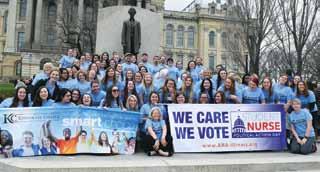







SNPAD & Lobby Day continued from page 1
• DePaul University
• Frontier Community College
• Governors State University
• Graceland University
• Graham Hospital School of Nursing
• Harper College
• Mennonite College of Nursing, Illinois State University
• Illinois Wesleyan University
• Kishwaukee College
• Lewis & Clark Community College
• Lincoln Land Community College
• Lincoln Trail College – Illinois Eastern Community College
• Marcella Niehoff School of Nursing, Loyola University, Chicago
• MacMurray College
• Millikin University
• North Park University, Chicago
• Northern Illinois University
• Oakton Community College
• Olivet Nazarene University
• St. Anthony College of Nursing
• Resurrection University
• Robert Morris University
• St. Xavier University
• Sauk Valley Community College
• Southern Illinois University Edwardsville
• Southwestern Illinois College
• St John’s College of Nursing
• University of Illinois @ Chicago College of Nursing
– Chicago, Springfield & Urbana Campus’
• Leach College of Nursing, University of St Francis
• Wabash Valley College - Illinois Eastern Community College
• Western Illinois University, School of Nursing
Exhibitors included:
• Rassmussen College
• University of St. Francis
• Olivet Nazarene University
• University of Michigan
• Purdue University, Northwest
• Chamberlain College of Nursing
• Hurst Review Services
• IPHA – HIV AIDS
• Indiana Wesleyan University
• ANA-Illinois
• Illinois Nurses Foundation




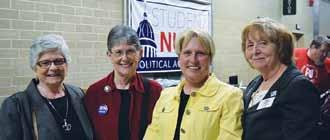


• Student Nurses Association of Illinois
• Nurses-PAC
• Emergency Nurses Association, Illinois Chapter
• Herzing University
• IDFPR/Illinois Center for Nursing
• University of Michigan
• Kaplan Review
• Blessing-Rieman College of Nursing
• Mennonite College of Nursing, ISU
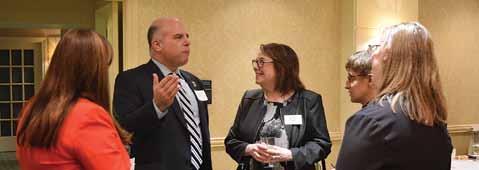









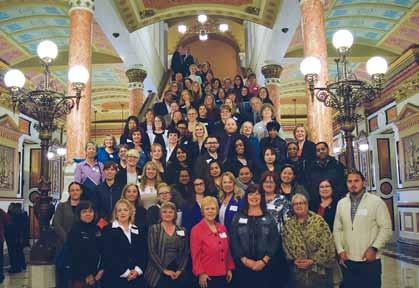





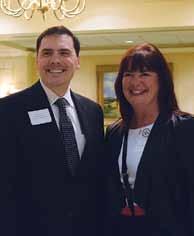
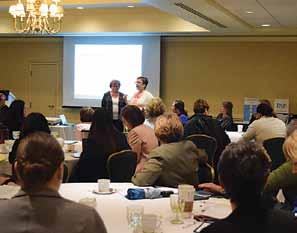

To assist RNs in the pursuit of a wide range of nursing degrees, ANA-Illinois has formed educational partnerships with universities that offer exclusive discounts on nursing degree programs to ANA-Illinois members.
Each educational partner offers nursing programs that are accredited by either the Commission on Collegiate Nursing Education or the National League for Nursing Accrediting Commission.
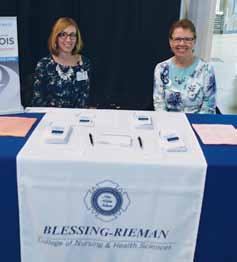
• Blessing-Rieman College of Nursing
• Olivet Nazarene University
• Purdue University
• Rasmussen College
• University of St Francis


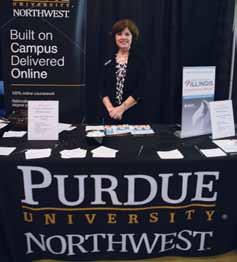





SNPAD & Lobby Day continued from page 5
POSTER WINNERS –
1ST PRIZE – $100 IN CASH
Kimberly Kuta-Edmonds, Nicole Rodiek, Selina Garcia, and Rouen Fajutrao attending Robert Morris University
2ND PRIZE $50 IN CASH
Aleena Hammelman, Emily Kitsmiller, Jaqueline G, Jesse Pate, Raquel Romano, and Vannesa K – attending Sauk Valley Community College
OTHER PRIZE WINNERS:
KINDLE FIRE HD 8 TABLET DONATED BY ANA-ILLINOIS
Ashley Humphrey – Southwestern Illinois College
UMBRELLA DONATED BY BLESSING-RIEMAN COLLEGE OF NURSING & HEALTH SCIENCES
Gina Reynolds – Mennonite College of Nursing
T- SHIRT DONATED BY BLESSING-RIEMAN COLLEGE OF NURSING & HEALTH SCIENCES
Amy Farr – Blessing-Rieman College of Nursing
TEST REVIEWS DONATED BY HURST REVIEW SERVICES
Tracy Lewis- Lewis & Clark Community College
Mallory Warnecke – Southwestern Illinois College
BACK PACK DONATED BY NORTHERN ILLINOIS UNIVERSITY
Kimberly Edmunds – Robert Morris University
$25 GIFT CARD DUNKIN DONUTS DONATED BY THE ILLINOIS CENTER FOR NURSING
Amanda Kurtz – Southwestern Illinois College
$25 STARBUCKS DONATED BY THE ILLINOIS CENTER FOR NURSING
Breanna Eastman – Mennonite College of Nursing, ISU
INSULATED GIFT BAGS DONATED BY ANA-ILLINOIS
Kami Li – Chamberlain College of Nursing
Angie Mccoy – Sauk Valley Community College
THERMOS DONATED BY UNIVERSITY OF ST FRANCIS
Brittany Schulte – Southwestern Illinois College
NCLEX REVIEW DONATED BY KAPLAN TEST PREP
Shanell Singh – Chamberlain College of Nursing
DRUG GUIDE DONATED BY KAPLAN TEST PREP
Emily Chaffee – North Park University
Max Denton – Milliken University
Kaitlynn Goff – North Park University
Shannon Grant – Olivet Nazarene University
Bethany Marvel – Graham Hospital College of Nursing
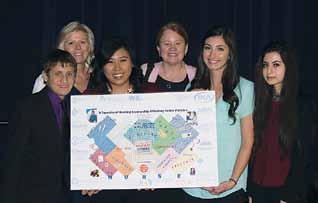
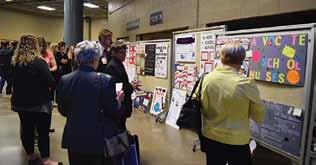


PHONE CHARGER DONATED BY HERZING UNIVERSITY
Kelsey Shaver – Marcella Niehoff School of Nursing, Loyola
Kaitlin Camensich – Western Illinois University
Amanda Welte – St. John’s College of Nursing
GIFT BAG DONATED BY RASMUSSEN COLLEGE
Dominique Coles – Chicago State University
PEN & STYLIST DONATED BY INDIANA WESLEYAN UNIVERSITY
Krista Jones – University of Illinois @ Chicago
GIFT BAG DONATED BY CHAMBERLAIN COLLEGE
Jennifer Cooper – Graham Hospital College of Nursing
Deborah Marshall – Olivet Nazarene University
Kelsey Stegall – Southwestern Illinois College
Misty Loghlin – Southwestern Illinois College
Kellie Spencer – Southwestern Illinois College
Elizabeth Olenjicak
Diana Silva – Olivet Nazarene University
STARBUCKS GIFT CARD & WATER BOTTLE DONATED BY PURDUE UNIVERSITY NORTHWEST
Angela Sutton – Frontier Community College
BACK PACK DONATED BY UNIVERSITY OF MICHIGAN
Emily Kitsmiller – Sauk Valley Community College
T SHIRT DONATED BY STUDENT NURSES ASSOCIATION OF ILLINOIS
Rebecca Smith – Lewis & Clark Community College
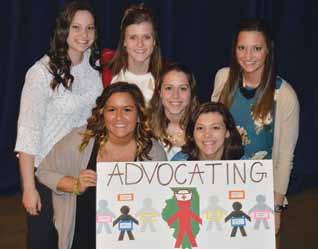












Every child deserves a certified school nurse! Members of the Illinois Association of School Nurses (IASN) were present at Nurse Lobby Day, advocating for our profession and its future.
Left to right: Sandra Lawinger, Chairman of Legislative Affairs, Linda Vollinger, President, Gloria E. Barrera, NAHN-IL Rep for IASN
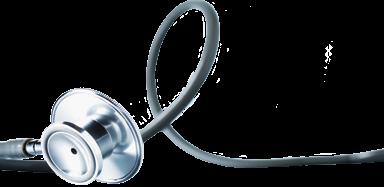



Since the start of April the Illinois Nurses Foundation has been accepting nominations for the 3rd Annual 40 Under 40 Emerging Nurse Leader Awards. The awards will recognize 40 Illinois RNs younger than 40 who positively represent their profession by participating in the community as well as professional organizations. Nominations were due by June 1st.
Winners will be chosen by their peers based on the following criteria:
Positively represent the nursing profession by actively participating in the community and/or a professional organization.
Awards will be presented on September 14 at Rush University Medical Center's Searle Conference Center in Chicago.
• Winners will be notified in mid July.
Toni L. Oats, BSN, RN, President
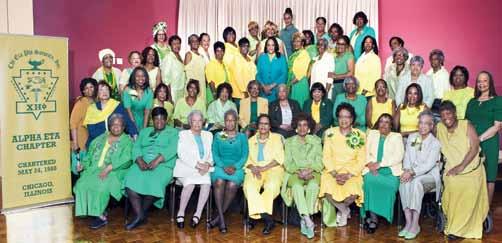
On April 8, 2017, Alpha Eta Chapter, Incorporated the Chicago Chapter of Chi Eta Phi Sorority, Incorporated hosted its 29th Annual Robert Reid Scholarship Fundraiser Luncheon at the Serbian Social Center in Lansing, IL. The luncheon is named in honor of Mr. Robert Reid, who was the first black male nurse to join the chapter. $4800.00 in scholarships were awarded to four nursing students from Chamberlin College, Chicago State University and Malcolm X College Nursing Schools. Charted in 1980, Alpha Eta Chapter, Incorporated has given over $75,000.00 in scholarships in the last 29 years to nursing students enrolled in RN, DNP or PhD nursing programs.
Chi Eta Phi Sorority, Incorporated is an international sorority of professional nurses and nursing students. The nursing sorority was established in Washington, DC at Freedman’s Hospital in 1932, and has a membership of more than 3000 nurses. There are 83 Graduate Chapters and 39 Undergraduate Chapters in the United States including the Virgin Islands. Chi Eta Phi Sorority is a recognized leader in the provision of health education, leadership development and service to the community. Alpha Eta Chapter, Incorporated will host the 2018 Middlewest Region Educational Conference and the 2019 Biannual Chi Eta Phi Sorority, Incorporated National Conference. To learn more about Alpha Eta Chapter, Incorporated, visit our website @ alphaeta-chietaphi.org
• Watch for the announcement and the opportunity to recognize a colleague or an employee by placing an ad in the program book.
September 14, 2017
Rush University Medical Center's Searle Conference Center
1725 W. Harrison St., 5th Floor, Professional Bldg.
5 P.M. - 6:30 P.M.
Networking with cocktails and hors d'oeuvres 6:30 P.M. - 8 P.M. Awards Ceremony
We want to celebrate and encourage exemplar dedication to the nursing profession, dedicated service within the community and the promise to grow in leadership for the advancement of nursing in ILLINOIS.
Planning Committee
Rhys A. Gibson BSN, RN - CHAIR Toni Scott MSN, RN, CYT
Stephanie Mendoza RN, MSN Carmen Vergara BSN, MPH, RN
Shannon Halloway PhD(c), BSN, RN Eli Heicher MSN, RN
Dan Fraczkowski MSN, RN Reenu Varghese DNP, APN, NP-C
Advisory Group
Susana Gonzalez MHA, MSN, RN, CNML
Linda B. Roberts MSN, RN
Susan Y. Swart MS, RN, CAE

www.facebook.com/40under40nurse

Dr. Alma J. Labunski, PhD. MS, RN Consultant, “Educational
Challenges Within A Global Culture Consulting Practices”
Retired Dean and Professor, North Park University, School of Nursing
Introduction
The purpose of this paper is to present the ethical and/or conflicting perspectives of promoting health care within a parish community. The document incorporates serving as a referral and/or mediating agent regarding stressful health/illness based conditions among parishioners. In developing an organized, formal network for communicating and/or connecting with individuals and families on a regular basis, it seeks to address the professional’s ethical role/responsibility towards formative review and appropriate data dissemination, collaboration and partnerships with parish leaders. A brief review of ethical standards for care, potential violation of standards and principles of application are discussed via use of a case presentation and analysis.
Outcomes
Upon Review of this article and case presentation, the professional nurse will be able to:
1. Understand the ethical and/or conflicting perspectives of promoting healthy, safe care within a parish community.
2. Analyze the appropriate ethical role of the professional nurse.
3. Review ethical standards for care and principles of application.
4. Discuss potential violation of standards of care.
Case Presentation
Ms. J. is a 71 year old, single, retired administrative assistant who has remained in a one bedroom apartment dwelling for the past 40 years. She has one married sibling and three nieces and nephews all of whom have their own family and reside within the same region. Minimal additional familial information is available, to date.
Acquaintances of Ms. J. state that she has been “plagued” with depression for the past 20 years, presumably because as she reportedly insisted, “I never married” and “had my own children." Despite earnest
initiatives on the part of friends, acquaintances and health care professionals, Ms. J. refused professional intervention for her mental status explaining “it wasn’t the Christian thing to do."
As the weeks and months within the previous two years have passed, Ms. J. has notably become more cognitively and emotionally impaired. She also has demonstrated more physical immobility. Although complaints of pain increased, acquaintances and friends attributed the complaints to her long term need for attention vis-à-vis bona fide pain. In their view, Ms. J.’s pain was “all in her mind," and she did not require any definite intervention. Also, a review of Ms. J.’s apartment furnishings and status reflected increasing dishevelment, filth and disarray. Similarly, a review of her person revealed an unkempt, dirty appearance. Hence, her colleagues reported that these observations confirmed their “assessment."
Nonetheless, pursuant to increasingly reported bouts of pelvic pain, Ms. J. refused to accept pain management, however, with extensive persuasion for one month, agreed to seek an orthopedic specialist who reviewed the extent of her complaints, undertook several diagnostic tests and diagnosed Ms. J. with extensive osteoarthritis of the right hip, hypertension and chronic obstructive pulmonary disease (COPD). Given the extent of her condition, the physician urged Ms. J. to undergo right hip joint replacement surgery; however, due to his busy surgical schedule, the procedure was scheduled for one month following Ms. J.’s appointment.
In the interim, friends and health care personnel followed Ms. J. with visits, meals and home care. Inquiries were made about the family, Ms. J. insisted that her family never visited her. “They don’t care about me; I am all alone” were frequently reported statements. As a long-term member of a parish comprising several caring friends and health care professionals who were sensitive to her needs, Ms. J. continued to be well prepared for the anticipated surgical procedure. In fact, Ms. J. signed advanced directives via one supportive friend who agreed to serve as her Durable Power of Attorney (DPA) for health care decisions and the executor of her Will.
In the ensuing weeks, given the extensive cartilage deterioration of her right hip, Ms. J.’s current physical state prompted complaints of increasing pain and dyspnea. Also, her mental state appeared to deteriorate,


as she became increasingly disoriented to the locus of her condition and her residence. Ms. J.’s preoperative planning was made and she was accompanied by a parish-based friend and the DPA. Although her brother and sister-in-law, who reside approximately 50 miles away, were kept informed of her status, pending surgery and need for postoperative therapy at a rehabilitation center, no response from the family members ensued. Ms. J. underwent surgery; she was provided with quality-based postoperative care and monitored for changes in her chronic pulmonary disease and hypertension. Within five days, Ms. J. was transferred to a rehabilitation facility for physical therapy recovery.
Two weeks postoperatively, Ms. J.’s rehabilitation was reaching its maximum potential. When informed of her status, she became more dyspneic, stated she was lost, didn’t know what to do or where to go thereafter. She refused to return to her home; she indicated she couldn’t stay in her apartment alone and could not provide self care. Hence, based upon her expressed needs and permission, the DPA, concomitant with the health care professional’s consultation, made arrangements for her to reside in the facility as a permanent resident. With her approval, Ms. J. was transferred to the permanent section of the facility whereby she would have her own room, own furnishings, clothing and other items in order to provide a sense of “home” to her.
Nonetheless, the changes in room, unit and personnel prompted increased confusion. “I don’t know where I am or what I should do” were her continuing expressed concerns. Subsequent psychiatric intervention confirmed Ms. J.’s clinical diagnosis of long-standing depression and the need for continuing psychiatric intervention and monitoring.
Subsequent to her new location, the DPA informed Ms. J.’s brother and sister-in-law of her room change within the facility. Notwithstanding their absence to date, upon learning of these changes, family members immediately contacted the agency, the unit and the supervisor and informed them of Ms. J.’s discharge. Both psychiatric and orthopedic physicians reported that Ms. J. was not eligible for further changes at this time. She required continuing follow up care from them and ongoing psychiatric therapy prior to confirming her readiness for discharge. Concurrently, the designated caregiver and DPA immediately contacted the senior pastor of the patient’s parish to inform him of the family’s demands. The pastor expressed regrets, however, confirmed that the church was not involved and, “should not get involved in the affairs of the family and the case." Angered by the pastor’s response, the caregiver and DPA also unsuccessfully attempted to contact the health care professional for advice. Shortly thereafter, family members met the caregiver on the doorstep of the facility and confrontation occurred. The patient was mandated by the family to dress, pack her belongings and be discharged without permission to leave. Ms. J.’s brother and sister-in-law also demanded that the DPA accept resignation of DPA service via a written document absolving the DPA of any responsibility. Ms. J.’s belongings were quickly packed, and Ms. J. was “whisked away” from the facility within the next fifteen minutes. Upon departure, family members strongly urged that no contact be made via phone or correspondence on the part of the caregiver and DPA and other accompanying church-based acquaintances.
In order to determine appropriate decision making in the health care delivery of older adults with complex


needs such as Ms. J., the incorporation of ethics as a thoughtful, ethically-based process for determining the right and best decision is critical. As nursing professionals consult the ANA Code of Ethics for Nurses with Interpretive Statements (2015) for guidance, this assumes upholding concepts of personhood, health and an environment which corroborate with the patient’s values, feelings, health care needs, services, health care resources, and one which balances the rights of older adults with the need for those older adults to participate or refuse care. Considerations to appropriate care and decision making include:
1. Assessment of the need for intervening treatment.
a. A brief review of two major theories of the discipline of ethics reflects its roots in philosophy and theology. The two major theories: DEONTOLOGY, based upon the work of Immanuel Kant, proposes that right decisions are made by following certain rules or principles (Guyer, 2007). Examples are beneficence; nonmaleficence, autonomy, individual respect, alleviation of suffering, and death with dignity. UTILITARIANISM is the second major theory. It purports that benefits outweigh the burdens for individuals, and the greatest good for the greatest in society must be followed (Johnson, 2014). Also, review of the more recent theory, VIRTUE Ethics, based upon Plato, Aristotle, and early Christian teachers, posits that the basic function of morality ethics is the moral character of persons that is valued (Praeger, 2006).
b. The Code of Ethics for Nurses with Interpretive Statements (ANA, 2015) is a a guide for carrying out nursing responsibilities in a manner consistent with quality in nursing care and the ethical obligations of the profession
c. A review of the ethical elements to be considered are:
1. What was the specific ethical issue in Ms. J.’s case? What were the facts of the situation? What decisions needed to be made? Who were the decision-makers? What moral principles were involved? What may be the consequences pertaining to the situation?






What ethics included compassionate discernment or insight into approrpriate actions based on the patients’ wishes and best interests?
2. If family had been involved, should they have been the most influential in the decisionmaking process?
a. Determined patient’s history and values toward life?
b. Confirmed whether she has a DPA and a Living Will?
c. Determined her level of autonomy?
d. Determined extent of illness: mental instability, status of COPD and hypertension? - Are they compensated? Status of hip joint’s osteoarthritis and need for replacement?
2. Discussion of methods to preserve mental competence and patient’s own personhood. Coordinator should have addressed:
a. major changes in environment (e.g., increased personal dishevelment, dirt, disarray, confusion);
b. Mental exercises should have been incorporated;
c. Physical activity recommended;
d. Socialization promoted;
e. Psychiatric consultation, medications and individual and group therapy recommended.
3. Assessment of patient’s level of autonomy and ability to self manage.
a. Needed retirement setting with assisted living potential.
b. Appeared unable to self manage due to the current mental status and long term mental illness.
c. Future balancing may have assisted to promote self-management.
4. How should the registered professional nurse have “handled” DPA activities with or without the next of kin?
Regarding handling Durable Power of Attorney (DPA) concerns, first, patient should have been queried regarding extent of knowledge regarding DPA. Patient should have been informed of DPA’s and Living Will’s purpose and functions. If requested, the health care professional should have provided
suggestions for DPA. Reviewing responsibilities of the individual was critical. Also, selecting a respected, cognitively strong, local resident was most useful, rather than an unknown entity. Generally, requesting a relative would have been acceptable given the qualifications, characteristics/ attributes that would provide the patient with the most objective, compassionate, informed, critical thinking decisions when and as needed.
5. Status of impact of utilizing a health professional with parish accountability.
Confidentiality of health care reigns “supreme” for the patient with professional parish accountability; it indicated that open, interacting non confidential information (i.e., not specific information) should have been reported by a professional, (e.g., needed care, incurred hospitalization, selected a DPA, etc.).
6. Extent of responsibility and/or accountability of church leaders or Pastoral staff.
Church leaders/parish pastors have no responsibility/accountability regarding health. Rather, they should seek to be generally informed and to intervene only to visit, guide spiritually as needed, where appropriate. Conflict was present; DPA insisted Pastor was responsible.
7. Need for intervention in psychiatric evaluation; orthopedic evaluation of “bone on bone” assessment of pelvic bone with femur.
Psychiatric evaluation was critical to recovering health. It should have included individual sessions, antidepressants as needed, and later, group sessions. Orthopedist, likely one specific to hip joint repairs, was needed for surgical intervention.
8. Assessment of individual’s information regarding a Living Will and a Durable Power Attorney (DPA) for health care decisions.
It was the health professional’s responsibility to inform the patient regarding the Living Will and Durable Power of Attorney for health care decisions.
9. Challenging personal behaviors. Ethically whose responsibility regarding the deterioration? Whose legal responsibility for health care decisions?
CE Offering continued on page 10


10 June 2017
CE Offering continued from page 9
Are parish leaders responsible for intervening in health care decision-making?
Challenging personal behaviors were depicted. If the patient were able, she should have been guided to seek psychiatric assessment and intervention. If unable, it was the professional’s role to make recommendations to DPA. Friend may have assisted patient in maintaining a clean, healthy status, physically. She should be cleaned regularly and should be involved in her physical appearance and the rationale for keeping clean and in as healthy a state as possible. Health care decisions legally should have been made by the patient and if unable, her next of kin or DPA if a DPA had been assigned to her care.
10. Activities of Daily Living: No bathing; lack of fluids; minimal nutritional intake; lack of clean clothing; food, debris, and bird dirt on floor in apartment. Upon whose responsibility were these activities?
Activities of daily living should have been provided and promoted by friends and the health care professional who approached ADL’s from a health-based perspective. Restated, if they were unavailable, the DPA would have been responsible for maintaining cleanliness and proper nutritional intake. This would have retarded the likelihood of developing infections and disease, especially in light of her long term COPD and hypertension condition.
11. Interference of sister-in-law in rehabilitation. Were her final deliberations appropriate? Ethical? Legal?
Sister-in-law and brother were next of kin. Generally the next of kin will assist and/or make decisions given patient’s inability to make one’s own decisions. If one were previously designated as a DPA by the patient during her cognitive state, decisions would be made by the DPA. Was sisterin-law’s behavior appropriate? No. Were final deliberations appropriate? No. They would likely have been if she had implemented these actions in a different culture/frame of mind. Legally, she had the right to intervene if the patient is


incapable of determining own decisions. See #12 statements.
12. Should the behavior of the family have been reported? If so, to whom? Responses? Should the behavior of the sister-in-law have been reported? (eg. To the Commission on Aging - IL}? Historically, there had been long term abuse and neglect by the brother and sister-in-law. Although they may have had the “right” to take responsibility, they demonstrated unethical behavior throughout many years. Additionally, they lacked medical approval from two specialists for discharging the patient. Restated they discharged the patient without agency and/or physician’s permission; and, they violated ethical and legal principles.
13. Examine an “ethical” process of developing a formal network for communication with individuals/families needing care and parish leaders while maintaining the Health Insurance Portability and Accountability Act (HIPAA) regulations, effective in 2002, for protecting patients’ privacy.
Draft of Process may include the following:
a. Patient presents needs to friend/acquaintance for care.
b. Parish friend seeks to assist patient and informs health care coordinator/mediator and/or parish staff.
c. Responsibility and status of health care coordinator and pastoral staff as partners is clarified.
d. Extent, if any, of collaboration with spiritual lay leaders (e.g. elders, deaconesses) to maintain continuity of integrating faith and health.
In summary, the health care coordinator should have assumed confidential responsibility for care of the patient. The parish pastoral staff were not responsible. The patient’s basic problem was not a spiritual one. (although most likely, patient was spiritually affected by her mental condition). No collaboration was needed at this time except for the health care professional to inform spiritual leaders of the need for spiritual support on behalf of the patient.



CE Offering
1.0 Contact Hours
This offering expires in 2 years: June 10, 2019
Learner Outcome:
After reading the article, the nurse will be able to discuss the ethical role of the professional nurse in promoting health and safe care within the parish community.
HOW TO EARN
CONTINUING EDUCATION CREDIT
This course is 1.0 Contact Hours
1. Read the Continuing Education Article
2. Go to https://ilnursesfoundation.wufoo.com/ forms/june-2017self-study/ to complete the test and evaluation. This link is also available on the INF website www.illinoisnurses. foundation under programs.
3. Submit payment online.
4. After the test is graded, the CE certificate will be emailed to you.
HARD COPY TEST MAY BE DOWNLOADED via the INF website www.illinoisnurses.foundation under programs.
DEADLINE TEST AND EVALUATION MUST BE COMPLETED BY JUNE 10, 2019
Complete online payment of processing fee as follows:
ANA-Illinois members- $7.50 Non members- $15.00
ACHIEVEMENT
To earn 1.0 contact hours of continuing education, you must achieve a score of 80% If you do not pass the test, you may take it again at no additional charge
Certificates indicating successful completion of this offering will be emailed to you.
The planners and faculty have declared no conflict of interest.
This continuing nursing education activity was approved by the Ohio Nurses Association, an accredited approver by the American Nurses Credentialing Center’s Commission on Accreditation. (OBN-001-91)
CE quiz, evaluation, and payment are available online at https://ilnursesfoundation.wufoo.com/ forms/june-2017self-study/ or via the INF website www.illinoisnurses.foundation under programs.


















Reprinted with permission of The American Nurse
Retaining newly hired, competent nurses — whether new graduates or experienced RNs — is good is for everyone: employers, staff, patients and the new employees, themselves. What are vital to their tenure, however, may be how they are transitioned into the workplace and whether the organization is committed to a culture of safety.
“Orientation is the first step in retaining nurses,” said Dennis Sherrod, EdD, RN, professor and Forsyth Medical Center Endowed Chair of Recruitment and Retention at Winston-Salem State University and a member and past-president of the North Carolina Nurses Association. “Although it’s difficult when working with a large group of new employees, it’s important that the orientation be nurse-centered, meaning individualized as much as possible to their needs, that there is a mentorship piece in place and that newly hired nurses are introduced to the culture of the workplace early on.”
Nurse turnover is an ongoing issue — with some health care facilities faring better than others. According to the 2016 National Healthcare Retention & RN Staffing Report by NSI Nursing Solutions, Inc., the turnover rate for bedside RNs rose to 17.2 percent in 2015, an increase from 16.4 percent in 2014.
According to a 2014 article in Policy, Politics, & Nursing Practice, New York University College of Nursing Professor and researcher Christine T. Kovner, PhD, RN, FAAN, and colleagues reported that about 17.5 percent of new nurses leave their initial job within the first year.
Beyond the upheaval on units, nurse turnover is costly. The NSI Nursing Solutions, Inc., report noted “the average cost of a turnover for a bedside nurse ranges from $37,700 to $58,400, resulting in the average hospital losing $6.6 million. (Some reports place turnover costs even higher.)
Offering smoother and safer transitions
An overarching goal of Southeastern Health’s orientation program is promoting a culture of safety in newly hired employees – both new grads and experienced nurses, according to Cynthia McArthurKearney, DHA, MSN, RN, NE-BC, manager of Education Services at the North Carolina hospital system and NCNA member. This is accomplished, in part, by using concepts outlined in TeamSTEPPS.
TeamSTEPPS is a system aimed at assisting health care professionals to provide higher quality, safer patient care by strengthening their skills around teamwork, communication, conflict resolution and eliminating barriers to ensuring the best clinical outcomes for patients.
All RNs going through the nursing services orientation are exposed to the program’s concepts, and all preceptors receive specialized TeamSTEPPS training so they can reinforce important concepts specifically to new grads during orientation and in their residency program.
“We don’t need to train new grads on how to insert catheters or change dressings,” McArthur-Kearney said. “Although the tasks are important, we want to teach them critical thinking. And the focus needs to be on safety. We need to make sure new grads – and all our nurses – understand what a culture of safety looks like and why it’s important.”
For example, preceptors working with new grads emphasize the importance of teamwork to achieving positive patient outcomes, understanding the roles of each team member, and how to communicate effectively with team members, including patients and their families. Role playing is often employed, such as learning how to have an effective conversation with a team member who may want to do a clinical task in an outdated way, explained McArthur-Kearney.
“To have a culture of safety, nurses also need to be aware of their environment, what’s going on around them,” McArthur-Kearney said. “So we emphasize that if a nurse sees a team member who is not filling a role during a code or who appears overloaded with an influx of patients, for example, that nurse must step up to ensure the best patient outcomes.” They also are taught how to identify when a situation may be getting out of control, as well as de-escalation strategies.
Another important component of on-boarding at Southeastern Health is orienting all newly hired staff on concepts outlined in the hospital’s strategic pillars. These concepts focus on embracing a language of caring, being fully present when interacting with colleagues, patients and family members, and showing kindness, including through non-verbal cues.
Added McArthur-Kearney, these strategies not only help to create and maintain a culture of safety, but also help with staff retention.
The University of Alabama at Birmingham Medical Center changed the way it conducted its orientation and residency programs for new hires about four years ago, according to David James, DNP, RN, CCRN, CCNS, who previously served as the advanced practice nurse coordinator for Clinical Nursing Excellence at UABMC and is an Alabama State Nurses Association member.
“Orientation used to be more of an inservice-type model with a lot of content and a ‘parade of stars,’ where staff from various departments were given a few minutes to discuss their roles,” James said. “Now we’ve moved to a different model, taking the Quality & Safety Education for Nurses competencies used at the UAB School of Nursing and using them for our orientation schema.”
Developed by nurse leaders involved in the QSEN initiative, the competencies address quality and safety education around patient-centered care; teamwork and collaboration; evidence-based practice; quality improvement; safety; and informatics. (Please see the QSEN Institute website at www.qsen.org.)
Each day of the UABMC orientation is linked to one of those core competencies, James said. And although having everyone understand that patient safety is essential, it’s extremely important that nurses know what systems are in place to support patient safety – whether it’s evidence-based practice or the use of technology.
In terms of structure, all newly licensed RNs attend the five-day orientation, which also addresses UABMC workplace culture, and then participate in a yearlong residency program to help ease their transition into practice and hardwire key competencies, according to Connie White-Williams, PhD, RN, NE-BC, FAAN, the director of UABMC’s Center for Nursing Excellence and an American Nurses Association member.
“Our onboarding process for experienced nurses beyond the orientation is unit-based and individualized to their needs,” she said. For example, a nurse who has 15 years in cardiac care and is hired onto a neuro unit should not be expected to take a full workload as quickly as someone who was hired onto a unit they have vast experience in.
Further, White-Williams added that about a month after their employment, she and Chief Nursing Officer Terri Poe, DNP, RN, NE-BC, meet with these experienced nurse hires to get their input about what went well, where improvements can be made and whether they feel welcomed. And experienced nurses, like new grads, are assigned preceptors who serve as an ongoing resource.
But to ensure a culture of safety and to retain staff takes more.
“We have probably 900 new nurses this year who we are trying to successfully orient and onboard,” WhiteWilliams said. “We’re no different than anyone else in terms of trying to retain folks. It really does take a village to do this successfully, and it takes a lot of resources.”
A journey toward safety
“We say let’s hire for attitude and train for skill,” said Clyde A. Bristow III, MSN, RN, CENP, chief nursing officer at Wake Forest Baptist Health Lexington Medical Center and director of Clinical Education. “We can teach nurses how to insert an IV, but what we’re looking for are things like how does the nurse engage and communicate with patients, do they make them feel safe.”
Safety is an ongoing theme at WFBH. All newly hired staff must attend a four-hour program called Safety Starts Here within their first 90 days of employment, according to Bristow.
“We start early by weaving in culture of safety principles – those based on high reliability and best practices – throughout our [orientation and new grad residency] programs, and all newly hired nurses must integrate them into their care,” Bristow said. Those principles range from engaging in daily safety huddles to maintaining patient privacy to working collaboratively with all disciplines, and they are constantly reinforced.
All new hires also must commit to WFBH’s “patient and family promise,” according to Phyllis Knight-Brown, MSN, RN, WFBH clinical education manager and a member of the Association of Nursing Professional Development, an organizational affiliate of the American Nurses Association. That promise speaks to staff pledging to patients that they will keep them safe, care for them, involve them and their families in care, and respect them and their time.
“We also try to empower all our nurses to feel they can say, ‘I have a concern’ or ‘I need help,’ especially new nurses so they are not struggling alone,” she said.
Looking specifically at newly hired, newly licensed RNs, WFBH provides them with a yearlong, residency-

type program called Journeys. It consists of a general and a unit-based orientation; a structured preceptorship; quarterly workshops, which include simulated practice and didactic sessions; and the opportunity to network and gain support from their co-hort. Workshop content is specific to new nurses’ units, however, the eight-hour sessions also cover issues such as stress management and self care, cultural competence and diversity, safety terminology and resources, patient instability, and shared governance.
“We have some flexibility in the program so we can tailor it more to the needs of our new nurses,” Bristow said. “We don’t want to find out on the 89th day that they don’t get along with their preceptor or haven’t learned how to do x, y or z. So preceptors and nurse managers meet often to determine where someone might need training. Then that nurse is placed in a situation where he or she can learn, which really benefits them as new nurses.”
WFBH also has a network of resource nurses, including preceptors, who can continue to provide guidance and information after the orientation and residency is complete.
There is no secret recipe to creating a good orientation and onboarding program to retain competent and safetyfocused nurses, according to Sherrod. However, it needs to be competency-based, nurse managers and staff need to celebrate and welcome new hires, and everyone should have a mentor.
Beyond orientation and residencies, retention also is dependent on factors such as workload, effective collaboration, strong professional practice roles and a healthy work environment.
“Having this retention culture is a way to help prevent a revolving door of new hires and strengthen an organization’s culture of safety and retention by providing nurse-centered orientations and work policies,” Sherrod said. “And retention is everyone’s responsibility.”
– Susan Trossman is a writer-editor for the American Nurses Association.


The Illinois Organization of Nurse Leaders is celebrating its 40th anniversary throughout all of 2017, culminating in a celebration at its Annual Conference on September 21 at the Sheraton Lisle in Lisle, Illinois. Its members are taking the time to recognize the important contributions the organization has made so far to nursing practice in Illinois, and looking forward to a bright future.
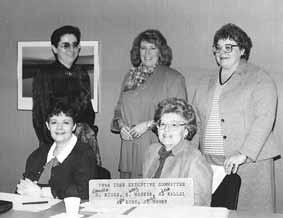
IONL was originally founded in 1977 with a mission to unify and promote nurse executive practice, and it was known from 1977 to 1987 as the Illinois Society for Nurse Administrators. On February 26, 1988, the Illinois Organization for Nurse Executives was officially incorporated in Illinois, and in 1996 became the Illinois Organization of Nurse Leaders, as it is known today.
Since its founding, IONL has expanded its focus to all nurses in leadership positions and potential nurse leaders, providing the tools and support necessary for excellence in the profession. Additionally, IONL develops strategic initiatives in the area of executive management expertise in healthcare systems. Its members benefit greatly from the relationships they are able to build within the organization, as being a member affords many opportunities to network with fellow leaders working in all aspects of healthcare and find mentors and collaborators to work with.
In order to achieve its mission of advancing leadership among Illinois nurses, IONL provides many opportunities for inperson and online education throughout the year as well as both a Mid-Year and an Annual Conference September 21-22. Its offerings include the Midwest Institute for Healthcare Leadership, held in conjunction with Loyola’s Quinlan School of Business on June 12-14, that focuses on essential business techniques for nurse leaders; an Aspiring Nurse Leader Workshop on November 17; and online webinars throughout the year. The organization’s Lunch and Learn webinar series bundles together hour-long sessions from experts in varying fields in a way that allows entire hospital staff to participate. IONL’s Fellowship program allows nurses from throughout the state of Illinois to work with experienced educators to build their leadership skills.
The IONL has many successes to celebrate as it looks back on 40 years of bringing together nurse leaders in the state of Illinois, and with the strength of its membership and educational programs, there will be many promising years in the organization’s future as well.
For more information about IONL and the 40th Anniversary Celebration on September 21, visit www.ionl.org

Alma J. Labunski, PhD., MS, RN, Educational Consultant; Retired Dean and Professor, North Park University School of Nursing
The annual national conference of the American Society on Aging, March 20-24, 2017 was held at the Hyatt Regency Hotel in Chicago. Entitled, “Aging and America” it was designed to engage, stimulate, and support health professionals toward improving the lives of older adults and their families. The conference gathered over 3000 participants, including physical therapists, occupational therapists, social workers, physicians, agency administrators, University professors, and a few nurses, plus over 400 exhibitors for the five day event. Additionally, over 500 general sessions and 200+ poster presentations were available to participants. Content choices ranged from addressing aging in community, business and leadership, caregiving, clinical care, diversity and cultures of aging, integrated care networks, lifelong
learning, policy and ethics and technology accessibility. All were designed to expose, support and renew a vision that will assist professionals in their daily services. The entire event provided a stellar experience for all participants.
We a few of these dynamics so that readers may obtain a brief glimpse of what is available for attendees. Colleagues, you will want to make plans NOW to attend the Aging in America conference in 2018. Scheduled for March 26-29, 2018, in San Francisco, California, the conference will feature similar opportunities and hundreds of replicable service models. You will want to be represented; you have many skills to share. Hence, be sure to place these dates on your calendar. For any additional questions, please feel free to contact Dr. L. at ajlabu@aol.com
Dr. Labunski serves as Editor Emeritus, NURSING VOICE, V-P, IL Nurses Foundation, INF fund raising and Grant Committees, ANA-IL Bylaws, (IDPH LTC, IONL, Resurrection Governance, Commission On Aging, AAWSH)
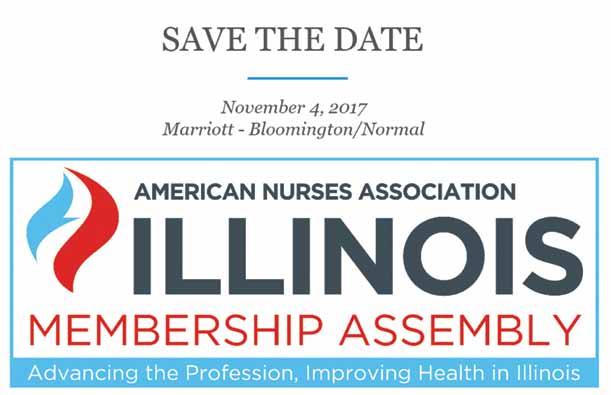

The National Association of Hispanic Nurses-Illinois Chapter vision is to become the resource for Hispanic nurses to gain the skills necessary in order to become influential health care leaders throughout the state of Illinois. Our Mission: NAHN-Illinois, a professional, voluntary and non-profit healthcare organization, dedicated to enriching the lives’ of Hispanic nurses and other health-oriented individuals through the promotion of academic attainment, professional advancement, cultural awareness and active participation in the Hispanic community.
February 22, 2017; NAHN-Illinois Celebrated their annual GO RED event it was a great networking event with sponsors, family, friends that value the contributions we make to the workforce. In addition; we share to Mark your calendars for the ANNUAL Scholarship event October 19, 2017; like us on Facebook.
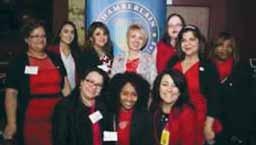






The Illinois Emergency Nurses Association (Illinois ENA) is the professional organization for emergency nurses in Illinois, representing 1,600 members.
We offer several educational events throughout the year. Our largest was the 43rd Annual Spring Symposium on April 20-21 at the Hilton Lisle that included the Advanced Clinical Program, General Sessions, Exhibit Hall, EBP Posters, Cadaver Labs, and Deep Dive session on transgender patients. The Illinois ENA-Sponsored Networking Dinner, Silent Auction that benefits the ENA Foundation for scholarships and grants, and our Annual Awards for outstanding emergency nurses took place in the evening on April 20. Emergency nurse and nurse humorist Terry Foster, who has been featured on several episodes of Untold Stories of the ER and Sex Sent Me to the ER, served as keynote and closing speaker.
The Education Committee is hosting several courses for 2017: Trauma Certified Registered Nurse (TCRN®) Review with Jeff Solheim, May 6-7 at Little Company of Mary Hospital in Evergreen Park; Certified Pediatric Emergency Nurse (CPEN®) Review, June 24-25 at Northwest Community Hospital in Arlington Heights; and
Certified Emergency Nurse (CEN®) Review, October 7-8 at Presence Saint Francis Hospital in Evanston. Illinois ENA is also partnering with the Illinois Attorney General’s Sexual Assault Nurse Examiner (SANE) Coordinator to host a SANE update this summer.
Illinois ENA is a member of the Illinois Coalition of Nursing Organization working on the Illinois Nurse Practice Act 2017 Sunset. Our Government Affairs Committee is sending three emergency nurses to the ENA Day on the Hill in Washington, DC in May to advocate for trauma care, mental health, substance abuse treatment, and continuing to allow EMS to administer life-saving medications.
The Injury Prevention Institute continues to promote safe teen driving through generous funding from State Farm by speaking with high schoolers and using our driving simulator. In addition, the Institute continues to support and host Child Passenger Safety (CPS) Technician courses with our partners, and Illinois ENA members educated the public on child passenger safety at the Chicago Auto Show.
Our Membership Committee is hard at work to recruit new members, and retain and engage current members,
and is planning a social event later this year for members to kickback, relax, and network with colleagues and friends.
The Trauma and Pediatric Committees continue to promote emergency nursing education through Trauma Nursing Core Course (TNCC) and Emergency Nursing Pediatric Course (ENPC) courses held around the state. Multiple Instructor Courses are being held this year; interested TNCC/ENPC providers should contact the committee chairpersons.
The 2017 Elections for open positions on the Board of Directors are in full-swing. Candidates will be announced April 20 and online voting is open for members April 21June 2.
Members are encouraged to attend our events and join committees to learn more about Illinois ENA. All emergency nurses are invited to attend our quarterly State Council Meetings (upcoming meeting May 20 in Evanston) which serve as an excellent networking opportunity. Visit IllinoisENA.org to learn more or contact Nicholas Nelson, 2017-2018 President, at president@ illinoisena.org
Silver Spring, MD — The American Nurses Credentialing Center (ANCC) announced the appointment of Loressa Cole, DNP, MBA, RN, FACHE, NEA-BC, as its executive director/executive vice president. As the leader of ANCC's full portfolio of credentialing programs, she will guide the organization to fulfill its strategic vision of nursing excellence, quality care and improved patient outcomes.
Executive Director/Executive Vice President:
Loressa Cole, DNP, MBA, RN, FACHE, NEA-BC
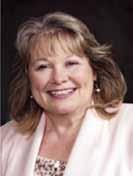
Vice President:
Dr. Cole is an accomplished health care leader who brings more than 30 years of nursing and management experience, most recently as the chief nursing executive for LewisGale Regional Health System located in Salem, Virginia, where she directed system-wide clinical operations, partnering with other C-suite leaders on strategic and tactical planning and execution. Previously, she served as chief nursing officer at LewisGale Montgomery Hospital in Blacksburg, Virginia, where she led the hospital to achieve its initial Magnet Recognition® in 2009 and its redesignation in 2013. Dr. Cole began her career as a staff registered nurse and administrative nursing supervisor.
Jeffrey N. Doucette, DNP, RN, FACHE, NEA-BC, CENP, LNHA

Additionally, ANCC also announced the appointment of Jeffrey N. Doucette, DNP, RN, FACHE, NEA-BC, CENP, LNHA, as vice president of the Magnet Recognition and Pathway to Excellence® Programs. He is responsible for vision, governance and operations of the Magnet Recognition Program®, the Pathway to Excellence Program and any future credentialing programs recognizing nursing excellence at the organization, department or unit level.
Dr. Doucette is currently regional vice president of clinical services and chief nursing officer at Bon Secours Hampton Roads Health System in Suffolk, Virginia. Prior to that, he served from 2011 to 2016 as vice president of patient care services and chief nursing officer at Mary Immaculate Hospital and St. Francis Nursing Care Center in Newport News, Virginia. He brings extensive experience in executive nursing practice, academia and professional nursing organizations to the role. While at Mary Immaculate Hospital, he led the team in achieving initial Pathway to Excellence designation and redesignation. The hospital was further recognized as the 2013 Pathway Award® winner. He has been awarded an Executive Nurse Fellowship by the Robert Wood Johnson Foundation.
Dr. Cole will join the organization on Oct. 24 and Dr. Doucette will begin his new role on Dec. 5.
"We are pleased to welcome Dr. Cole and Dr. Doucette to ANCC and look forward to them leveraging their leadership skills and passion for excellence in nursing to fulfill our mission and vision," said ANCC President Patricia Reid Ponte, DNSc, RN, NEA-BC, FAAN.
"This is an exciting time for the American Nurses Association (ANA) Enterprise as we move forward with a focus on greater collaboration and synergy among ANCC, ANA and the American Nurses Foundation," said ANA Enterprise CEO Marla J. Weston, PhD, RN, FAAN. "Each of these new leaders embraces the belief that by working together, we will be better able to serve nurses and have a greater impact on health care through ANCC's credentialing programs."
Dr. Cole is active in many professional nursing organizations, including the Virginia Nurses Association, where she served as president from 2012 until 2014. She is a member of the American Organization of Nurse Executives, the Virginia Organization of Nurse Executives and the American College of Healthcare Executives. She has presented at a wide range of conferences, including the 2011 and 2012 ANCC National Magnet Conference®.
Dr. Cole earned her doctorate in nursing practice at Case Western Reserve University, her master's in business administration at Averett University and her bachelor of science in nursing from Virginia Commonwealth University. She is ANCC board-certified as a Nurse Executive, Advanced and is a Fellow of the American College of Healthcare Executives.
Dr. Doucette is active in many professional associations including the Virginia Nurses Association, where he currently serves as vice president. He has published in many professional journals and has presented at numerous conferences, including the Pathway to Excellence Conference® and ANCC National Magnet Conference. He holds a doctorate of nursing practice from Old Dominion University, a master's of science in health care administration and a bachelor's of science in nursing from Marymount University. He is ANCC board-certified as a Nurse Executive, Advanced and is a Fellow of the American College of Healthcare Executives. Additionally, he is a licensed nursing home administrator.
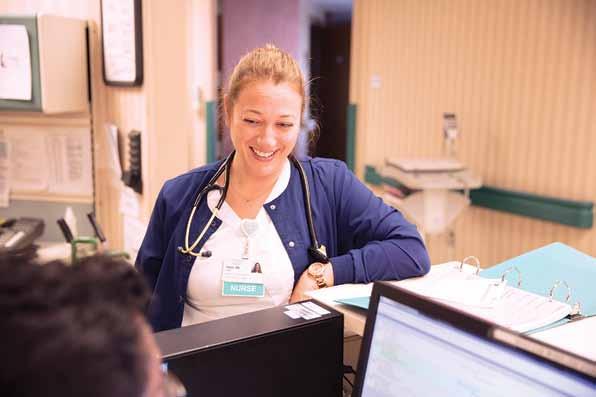


The Illinois Department of Financial and Professional Regulation/Illinois Board of Nursing, in conjunction with the National Council State Boards of Nursing/NCSBN®, is offering a free one-day workshop; participation is limited to Illinois nursing faculty on a first-come, first-serve basis. The NCSBN Examinations Department content staff will conduct this board-of-nursing-sponsored workshop for the purpose of providing information to educators who prepare students to take the National Council Licensure Examination/NCLEX exams.
NCLEX® Regional Workshop details: Friday, September 15, 2017 8:00 a.m. – 2:30 p.m. William Rainey Harper College 1200 W. Algonquin Road, Building D Room 195 Palatine, Illinois 60067
(Corner of Algonquin and Roselle Roads in Palatine) http://goforward.harpercollege.edu/about/visit/index.php
This NCLEX workshop is conducted by the experts that develop and administer the examinations and supported by Harper College. Thank you to Director of Nursing Julie D’Agostino, MS, APRN-CS, RN, for generously providing a forum for this event.
Workshop objectives include:
• Identify the NCSBN practice analysis process and explain how the results are used to update NCLEX test plans
• Illustrate basic principles of computer adaptive testing and describe standard setting
• Explain the steps of the NCLEX item development process
• Identify NCLEX alternate item formats
• Demonstrate and apply principles of item writing
• Identify the use and application of NCLEX® Program Reports and Candidate Performance Reports by nursing education programs
This NCLEX Workshop is for Illinois nursing faculty only, and space is limited. The purpose of this workshop is to provide information to educators who prepare students to take the NCLEX examination. You will not receive program material until you arrive on site at Harper College and sign in for the class. Participants are responsible for their own lunch.
Register for course #LNU 0052 online at www.harpercollege.edu/ce, click “choose classes and register” or call 847.925.6300. Registration deadline is September 1, 2017.

The Illinois Department of Financial and Professional Regulation website www.idfpr.com is regularly updated to provide Illinois licensed professionals with useful resources.
Please note that effective January 2017, previously barred health care workers and applicants with criminal convictions may once again become eligible for licensure in Illinois. Under a newly enacted law, the Illinois Department of Financial and Professional Regulation (“IDFPR”) has implemented a review process for impacted health care workers. This new law partially rescinds a 2011 law that automatically and permanently revoked or denied licensure for health care workers with certain felony convictions in their past.
Health care workers who qualify for review under the new law now have the opportunity to present information proving they have been rehabilitated from their conviction. Health care workers with certain felony convictions that have met the timing requirements under the new law may file a Petition for Review to determine whether their conviction is still a barrier to licensure. The new law sets forth the factors IDFPR may consider in determining whether a health care worker has been

rehabilitated. Factors include, but are not limited to, the seriousness of the offense, prior disciplinary history, and voluntary remedial actions.
Health care workers who have been permanently revoked or denied licensure may immediately file a Petition for Review to prove rehabilitation. First-time applicants must submit an initial application for licensure prior to filing a Petition for Review. If a Petition for Review is granted, the conviction is no longer a barrier to licensure. The previously barred health care worker or first-time applicant must still meet all licensure requirements. This may include submitting licensing forms, fingerprinting, and proving competency to practice.
For more information on IDFPR, please visit our website at www.idfpr.com. There you will find answers to Frequently Asked Questions (FAQs) http://www. idfpr.com/About/FAQ.asp and application information pertaining to each profession. You will also find the Petition for Review of Permanent Denial/Revocation (New Applicant) F.A.Q.’s. process. http://www.idfpr.com/FAQ/ DPR/ForcibleFelonyPetitionNewAppsFAQ.pdf
If applicable, please feel free to share this information.
Stephanie A. GedzykNieman MSN, RNC-MNN, DNP Candidate
Partnering with agencies during the Doctorate of Nursing Practice (DNP) program residency is a means of applying the knowledge and skills required for the degree to current healthcare needs. For this experience, a DNP student partnered with the Illinois Department of Financial and Professional Regulation (IDFPR) Board of Nursing (BON) and the Illinois Center for Nursing (ICN) to assist in the first-time creation of a report for healthcare planners regarding trends in Illinois pre-licensure nursing education programs, faculty and students from 20112015. Highlights of the report, partnership formation details, the report writing process, along with the knowledge and skills obtained by the DNP student through this experience were shared at Lewis University’s 6th Annual Celebration of Scholarship on April 20th, 2017. The purpose of this symposium is to celebrate research, scholarly work, and creative endeavors of Lewis students and faculty. This day-long event was very well attended and an excellent avenue to not only disseminate the report, but also encourage other DNP students to consider establishing similar partnerships for residency work.

the data contained in this report can be useful for: workforce planners, policy makers, colleges and universities with a nursing program or considering developing a program, nurse educators, and healthcare facilities/employers of nurses. Some of the positive pre-licensure nursing education trends identified from the analysis include the growth in the number of pre-licensure programs available, as well as enrollment, capacity, number of applicants and graduates; the pass rate for first-time test takers for both the NCLEX-RN® and NCLEX-PN® national licensure exam either meeting or exceeding the national average annually; and the growth in the number doctorally prepared nursing faculty. Areas that need continued attention are the ethnic and gender diversity among faculty and students as well as encouraging more nurses to pursue a career in nursing education. Additional report information can be found at http://nursing.illinois.gov/ ResearchData.asp

Nurses want to provide quality care for their patients.
The Nurses Political Action Committee (Nurses- PAC) makes sure Springfield gives them the resources to do that.
Help the Nurses-PAC, help YOU!
So. . . . . . . if you think nurses need more visibility if you think nurses united can speak more effectively in the political arena if you think involvement in the political process is every citizen’s responsibility.
Become a Nurses-PAC contributor TODAY!
❑ I wish to make my contribution via personal check (Make check payable to Nurses-PAC).
A key component in meeting nursing workforce supply is Illinois’ ability to produce new nurses through the pre-licensure nursing education system. Therefore,



Through this experience, the DNP student also gained a multitude of new knowledge and DNP leadership experience. Not only was there a greater understanding of the connection between nursing regulation, education, policy, and workforce planning at the state and national levels, but leadership, communication, and collaboration skills were also refined. Furthermore, data management and analysis abilities were strengthened along with professional writing and presentation skills.



The Illinois Public Health Nurse/PHN AcademicPractice Partnership Workgroup invites you to an all-day conference on developing academic-practice partnerships in the public health setting.
Friday, October 20, 2017 9:30am – 3:00pm UIC College of Nursing – Peoria Regional Campus 1 Illini Drive - Room #A100-2 Peoria, Illinois 61605
Registration link – http://conta.cc/2q6DZAA UIC Campus Info: http://www.nursing.uic.edu/campus/ peoria#campus_overview
The keynote speaker is Susan Zahner, DrPH, RN, FAAN, Associate Dean and Vilas Distinguished Achievement Professor, University of Wisconsin-Madison School of Nursing. Dr. Zahner, an expert in public health nursing, was the Principal Investigator for the “Linking Education and Practice for Excellence in Public Health Nursing Project (LEAP Project)” in Wisconsin. The LEAP Project worked to improve competency for public health nursing practice by educating public health nurses, student nurses, and nursing faculty to provide population-based, culturally competent public health nursing services. Key LEAP Project initiatives will be explored for use in Illinois as we work to build healthier communities in a changing public health system.
Participants will also hear from local and national experts, exploring opportunities to build healthier communities, innovative partnerships that benefit the nurses, students, public health nursing as a practice, and the community. Who should attend: all nurses and leaders working in public health, and all faculty working in nursing education. We encourage existing and newly formed academic-practice partners to attend as a team for enhanced learning.
Due to the generous support of the Robert Wood Johnson Foundation and the Illinois Nurses Foundation, the Public Health Nurse Workgroup is able to offer this conference at no charge to a limited number of faculty currently teaching in public health nursing and public health leaders in the community setting. We will hear from local and national experts, and will explore innovative public health nursing academic-practice partnerships.
This activity has been submitted to Ohio Nurses Association for approval to award contact hours. Ohio Nurses Association is accredited as an approver of continuing nursing education by the American Nurses Credentialing Center’s Commission on Accreditation.
To register for the conference please use this link: http://conta.cc/2q6DZAA . If you have questions, please contact Robin Hannon, RWJF PHNL Fellow with questions: robin.hannon@co.st-clari.il.us
❑ I wish to make a monthly contribution to NursesPAC via my checking account. By signing this form, I authorize the charge of the specified amount payable to Nurses-PAC be withdrawn from my account on or after the 15th of each month. (PLEASE INCLUDE A VOIDED CHECK WITH FORM)
❑ I wish to make my monthly Nurses-PAC contribution via credit card. By signing this form, I authorize the charge of the specified contribution to Nurses-PAC on or after the 15th of each month.
❑ I wish to make my annual lump sum Nurses-PAC contribution via a credit or debit card. By signing this form, I authorize ANA-Illinois to charge the specified contribution to Nurses-PAC via a ONE TIME credit/debit card charge.
❑ Mastercard ❑ VISA
Credit card number Expires CVV
Signature:
Date:
Printed Name:
E-Mail:
Address:
City, State, Zip Code:
Preferred Phone Number:
Please mail completed form & check to:
ANA-Illinois
Atten: Nurses-PAC PO Box 636 Manteno, Illinois 60950





